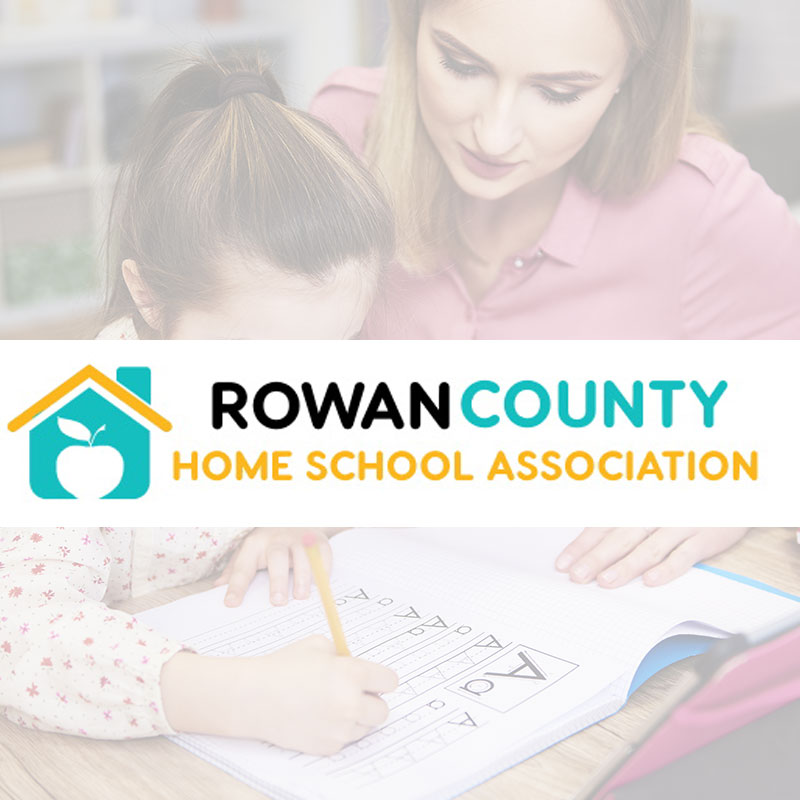What exactly is homeschooling? What do you do all day?
Homeschooling is educating your child outside of a public or private school. While a great deal of learning occurs at home, it is certainly not the only place where homeschooled children learn.
Homeschooling takes almost as many forms as there are families doing it — from a daily routine following a scheduled curriculum to child-led learning in which parents supervise and help. Since every family is unique (number and ages of children, personalities, interests, goals, etc.), each family will homeschool differently. It’s important to remember that there is no one “right” way to homeschool. Parents will discover their own teaching style and their children’s learning style.



Just as there is no such thing as a typical homeschooling family, it’s difficult to describe a typical homeschool day. Children learn from a variety of activities, such as reading, conversation, play, outside classes, volunteer work and apprenticeships. They typically will have some time on their own at home (to read, play, build, draw, write, do a science experiment, work on math), and some time with their parents (to get help with any of the above, to talk, to do work on a project together), and some time with others outside the home (in an art class, in Scouts, in a homeschoolers’ orchestra, in a volunteer job at an animal shelter). Some families set aside a specific part of the day for academic work; others do not. Often this varies for each child and the family often adapts its schedule as the children grow and their needs change.
Why do families choose homeschooling?
Families from every philosophical, religious, political, racial and economic group choose homeschooling as the best way to educate their children. It is almost impossible to list all of the reasons parents give for deciding to homeschool their children. However, parents do fall into three very broad, and increasingly overlapping, ideological groups:
- Religious/Moral Values: An estimated seventy-five percent of all homeschooling parents do so for religious reasons. Many parents feel that schools (including private, religion-based schools) do not address the spiritual issues and morals they want incorporated into their children’s education. Some parents object to the teaching of ideas and theories contrary to theirs — evolution and sex education, for example.
- Inadequate School-based Education: Growing numbers of parents are citing dissatisfaction with the level of their children’s education as the primary reason for homeschooling. Most parents in this group have had children in public and/or private schools, but decided to homeschool because of the lack of individual attention, inadequate teaching methods, and declining academic standards, as well as poor school performance by children that excel at home. Also, concerns about school safety have increased in recent years, resulting in an increase in the number of children who begin homeschooling during the middle and high school years.
- Political Beliefs: Parents in this group tend to be politically independant, and homeschool their children in an effort to distance themselves from institutions of all kinds that encroach on their freedom. Some also cite the restrictive school environment that allows for little if any student-led instruction as the primary reason for homeschooling.
- Many homeschooling parents believe that the social atmosphere of schools today is harmful to children and is not conducive to personal and intellectual growth.
- Many also cite a desire to play a more prominent role in their children’s education and lives.
People homeschool for myriad reasons. But their overwhelming reason is to get the best possible education for their children. Any classroom teacher will tell you that the children who succeed in school are those whose parents are involved in their education. Homeschooling simply brings that involvement to a new level. The learning process which begins at birth simply continues naturally with the parents as teachers. When this partnership is working well, why dissolve it merely because at a certain age, children are “supposed to be in school”?
What are some of the benefits of homeschooling?
Many families like the flexibility homeschooling provides both parents and children. Children can learn about things they are interested in and at a time in their lives when they are ready to learn. No preconceived schedule forces them ahead or holds them back.
Children learn about the ‘real world’ by being a part of it – no artificial settings are needed to ‘provide exposure.’ Children can receive a superior education attuned specifically to their own needs, learning styles, personalities, and interests – at far less cost than that of a private or public school. By being allowed to learn at their own pace, with a minimum of stress, homeschooled children have the time and space to internalize and use what they learn.
Homeschooling families spend a tremendous amount of time together living, learning and playing. They have the opportunity to develop a depth of understanding and a commitment to the family that is difficult to attain when family members spend their days going in separate directions.
A nice side benefit to homeschooling is that vacations and other outings can be planned for times when the family is ready – and often when the crowds are smaller or the costs are lower.
Is homeschooling legal?
Homeschooling is legal in all 50 states, although specific requirements vary. North Carolina law defines a homeschool as a non public school consisting of the children of not more than two families or households, where the parents or legal guardians or members of either household determine the scope and sequence of the academic instruction, provide academic instruction, and determine additional sources of academic instruction. General Statute 115C-563(a) as amended changes the definition of a homeschool to allow parents to hire tutors, let their children participate in group settings where they receive instruction (co-ops, 4-H classroom instruction, etc.) and be instructed by an expert that is not a part of the household in the established homeschool (apprenticeships, a homeschool doctor teaching biology, etc.) This will allow homeschool parents more freedom to choose what is best for the education of their children.
The North Carolina Division of Non-Public Education (DNPE) is authorized by state law to receive homeschool notices of intent to begin initial operation and to terminate operation, and to annually inspect the school’s student attendance and nationally standardized achievement test result records. Chief Administrators of homeschools should anticipate receiving a request(s) to meet with a DNPE representative at a public location in close proximity to the homeschool while the homeschool is in operation
Requirements
Parents/guardians residing in North Carolina and desiring, in lieu of conventional school attendance, to homeschool their children who are at least age 7 but not yet age 16 must:
- Hold at least a high school diploma or its equivalent;
- Send to DNPE a Notice of Intent to Operate a Homeschool. The notice must include the name and address of the school along with the name of the school’s owner and chief administrator;
- Elect to operate under either Part 1 or Part 2 of Article 39 of the North Carolina General Statutes as a religious or as a non-religious school;
- Operate the school “on a regular schedule, excluding reasonable holidays and vacations, during at least nine calendar months of the year”;
- Maintain at the school disease immunization and annual attendance records for each student;
- Have a nationally standardized achievement test administered annually to each student. The test must involve the subject areas of English grammar, reading, spelling, and mathematics. Records of the test results must be retained at the homeschool for at least one year and made available to DNPE when requested. Also, see testing FAQs;
- Notify DNPE when the school is no longer in operation.
For more information visit the NC Division on Non Public Education website.
How will my child learn to get along in the world if he doesn't go to school?
Oh, yes, the socialization question. The concern, it seems, is how homeschooled children could possibly function “in the real world” if they don’t have the experiences that schooled children have.
The reason 30 or more kids of the same age are grouped together in schoolrooms is one of necessity, not of desirability. Age-segregated classrooms are the most efficient means of caring for and educating as many kids as possible. The competitive atmosphere of school, coupled with inadequate supervision often brings out the worst in children. Much school socialization is negative. Homeschoolers can socialize in a loving, caring environment while they learn to get along with others.
In 1992 Larry Shyers of the University of Florida wrote a doctoral dissertation in which he challenged the notion that youngsters at home “lag” in social development. In his study, 8- to 10-year-old children were videotaped at play. Their behavior was observed by trained counselors who did not know which children went to regular schools and which were homeschooled. The study found no significant difference between the two groups of children in self-concept or assertiveness, which was measured by social development tests. But the videotapes showed that youngsters who were taught at home by their parents had consistently fewer behavior problems.
Few, if any, homeschoolers are actually isolated to the point where they don’t interact with other people. Most homeschoolers are heavily involved in their communities. They belong to Scouts and church groups, take swimming and dance lessons, play on soccer and softball teams, etc. Many do volunteer work such as visiting convalescent hospitals or shelving books at the library.
Homeschoolers also get together in local support groups for classes, activities, field trips and park days. They build deep and meaningful friendships, with more time and space to talk and learn from each other than would be possible in school.
Home educated children, because they spend so much of their time out in the real world, generally are able to communicate well with both adults and children. They choose to spend time with others because they enjoy their company or have a similar interest – just as adults do.
What if my child wants to learn something I can't teach?
The best teacher for any child is someone who loves and cares about them and their particular way of learning – someone who has the time and the patience to provide one-on-one instruction. Parents do what teachers wish they could do in the classroom but cannot for lack of time and help and an excess of students.
Parents, thankfully, do not have to be the expert in every area. Learn with your child, or search your community for resources that will help your child learn. Homeschooling families are fortunate to have the world as their classroom. There are classes (correspondence, video, support groups, community centers, colleges, etc.) taught by experts, but many children are very capable of teaching themselves – just as adults do when they have something new they want to learn.
And when searching for teachers, don’t overlook friends, acquaintances, and business people in your community – most are delighted to have a young person around who is sincerely interested in what they do and know.
Is homeschooling expensive?
Homeschooling can be as expensive or as inexpensive as you make it. It depends on many factors, including what kinds of materials and resources you choose to use, how many children you will be homeschooling, and whether or not you will be giving up paid employment in order to homeschool your children.
Parents can easily spend a small fortune on all the wonderful learning materials and books available. On the other hand, a superior education can also be accomplished using free resources found through the public library, interlibrary loan, and learning opportunities found in your community, such as museums and trips to interesting places.
How do I know which materials and resources to use?
This is, perhaps, the most difficult question to answer – be prepared for your answer to change over time and be aware that some of the choices you may make won’t always work out. Before you purchase any curriculum or materials, be certain they fit with your own educational philosophy, and not any preconceived notions of “schooling” you may have. School curriculum and methodology have evolved to reflect the classroom environment of 20 to 30 children with one adult in charge. Curriculum developed by experts for this particular environment has been designed for ease of teaching, not necessarily for sparking the interest of the individual child.
Traditional curriculum publishers and other companies are aggressively marketing to the growing number of homeschooling families. There is a large market of educational supplies of all kinds. There are many well-tried curricula and study programs for every educational philosophy. Some school districts welcome homeschooling families to use their curricula and textbooks, as well as may offer access to classes, extracurricular activities or school libraries.
In addition to curricula and textbooks, which usually serve only as a framework for education, homeschoolers go out into the community and the world at large for resources. Parks and recreation departments offer many classes and athletic opportunities. There are museums to visit, farms and factories, science fairs, and much more.
The public library is perhaps the greatest resource homeschoolers have. In addition to its huge selection of books, videos, and other materials, there are reading programs, lectures, and often classes.
The Internet is another tremendous resource for homeschooling families. In addition to all the benefits the Internet provides to homeschooling children, perhaps the most valuable service it provides is that of a support network for parents. Websites, email groups and newsgroups dedicated to homeschooling serve as a gathering place for homeschooling parents to discuss teaching methods, share information, ask questions, compare notes about educational materials, and seek advice for difficulties they may be facing.
Public television and cable channels such as the History Channel, Discovery Channel and The Learning Channel provide a wonderful way to learn about a wide variety of subjects. Educational guides and supplemental materials are frequently available from the stations at low- or no-cost.
As a homeschooling family, you can accept as many or as few of these materials as you like. Some families like the ease and security of having a prepackaged curriculum, while others choose to make their own decisions about what they want their children to learn and what is useful and helpful in their daily lives. As homeschoolers, you will be in charge of your learning – take advantage of all the adventure has to offer!
How will I know if my children are learning?
Children are always learning – they just can’t help it! Just like when they were babies and toddlers, you can discover what they are learning by spending time with them and observing the growth in their understanding of the world.
Sometimes we question our children to find out if they remember what they learned and to reinforce that learning; but this is usually just within the context of ordinary conversations, not in the form of a test.
Testing was designed as a way for teachers to find out if students understand the material presented in the classroom. When there is one teacher assessing the development of 20 to 30 students, testing is the easiest way to determine their achievement.
In a one-on-one learning environment, tests are often unnecessary. Few homeschooling parents give lectures on which their children are supposed to take notes and study – they discuss things. The children have the time and attention to ask as many questions as they need to clarify things, and together they can explore each subject. Sometimes trips to the library or visits to museums, historical sites, places of business, etc. are necessary to answer all the questions that come up.
Of course, homeschoolers who choose to have their children tested certainly can do so.
What about higher education?
Hundreds of colleges, universities (yes, even Harvard and Yale!) and vocational institutes all over the nation accept homeschooled students. They are thrilled with these intelligent, responsible, capable young people and many actively recruit them. Most of these institutions value ability and attitude over formal transcripts, diplomas or GEDs. In the absence of a transcript or high school diploma, applicants may submit samples or a portfolio of their work, letters of recommendation, and SAT and/or CLEP test scores. Libraries and bookstores carry a variety of books, directories and guides that will help older homeschoolers get information and prepare for this next step.
It should be noted that college is not necessarily the only or even the best route for every young person. Going to college without a clear idea of what you expect to gain can be a very expensive form of self-discovery. Herbert Kohl’s book, The Question Is College and Grace Llewellyn’s Teenage Liberation Handbook can be great helps to families working through these decisions.
For many teens who already know where they are headed, apprenticeship opportunities and other forms of ‘on-the-job’ training can be a faster and more satisfying entry into their adult lives. And remember, the decision to forgo college is never irrevocable. Most institutions highly value older students, since they are usually enthusiastic and focused on learning.
My child has been labeled learning disabled (or ADD or ADHD) - would homeschooling help?
Children with learning disabilities can and do learn at home. An important difference between a traditional school setting and a homeschool is a child can learn at his own pace at home and with the encouragement of people who are concerned with him as an individual. Homeschools can be tailored to address the unique needs and develop the strengths of students with learning disabilities.
The LD label may be the result of group instruction when a child does not follow the expected timetable, or learn in the expected way. In school, for example, a child who is not yet reading at age 7 may be identified as LD. In a homeschool setting, however, children learn to read when they are ready and frequently become fluent readers within a short period of time.
In New Hampshire, school districts are not obligated to provide services to a “special needs” child who is homeschooled.
I love the idea of homeschooling, but my spouse/parents/other relatives/friends are skeptical about the idea. What can I do?
This can be one of the biggest challenges a homeschooling family faces. Remember that many concerns about homeschooling are based on ignorance or misinformation. For example, a friend may worry that your child is being deprived of access to group experiences, not realizing that most homeschoolers participate in Scouts, community groups, homeschooling groups and other activities.
A skeptical relative may fear that this is simply your outrageous idea, not knowing about the thousands of successful homeschoolers who have gone before you. Many skeptics are reassured when they learn that homeschoolers have friends, get into college, and have a wide range of learning opportunities. Some people are also reassured by meeting other homeschoolers or listening to talks, workshops, or radio interviews.
After you have done some research and reading about homeschooling you will be better prepared to address your critic’s concerns, but remember that it can take time to feel comfortable with homeschooling, as with any new idea. Sometimes you may simply have to live with a friend’s or relative’s uncertainty for a while.
If you have other questions or would simply like to talk to someone about homeschooling in Rowan County, NC please Contact Us






